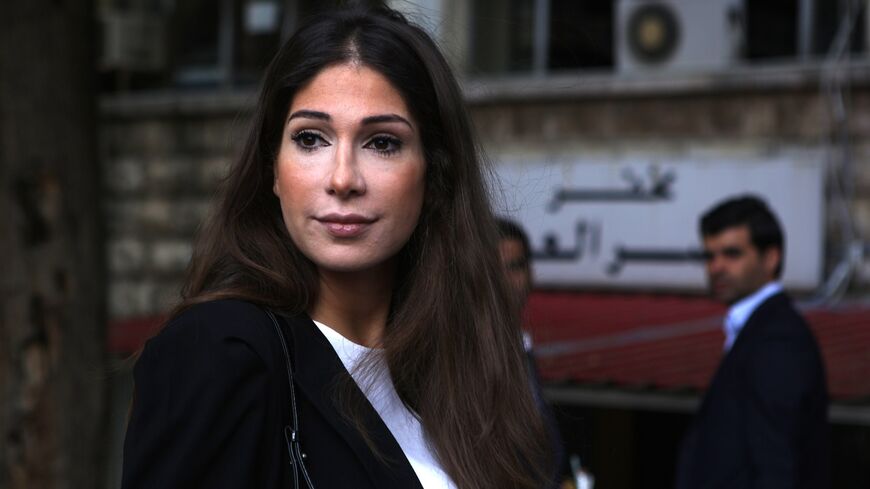BEIRUT — A wave of solidarity with prominent Lebanese journalist Dima Sadek has taken social media by storm in the past two days after Sadek was sentenced to one year in jail. The leader of one of the largest Christian political parties in the country had accused her of defamation, slander and inciting sectarian strife.
On Tuesday, Judge Rosine Hojeili issued the verdict, slapping Sadek with a jail sentence as well as a fine of 110 million Lebanese pounds (around $7,320) to be paid to the claimants.
In February 2020, Free Patriotic Movement (FPM) head Gebran Bassil sued Sadek over tweets in which she described the movement’s actions as “racist” and “Nazi-like.”
In videos posted on Twitter Tuesday, Sadek revealed details of the case, explaining that her comments concerned the beating of two young men from the Sunni-majority city of Tripoli in the north by FPM supporters in the district of Keserwan, which is predominantly Christian.
Sadek said that one of the men was forced to say “Aoun is your god and the god of Tripoli,” in reference to former President Michel Aoun, who was the head of the FPM before passing the torch to his son-in-law Bassil in 2015.
جبران طالب حبسي بقضية زكريا المصري اللي بحسب افادته الرسمية قال انه تم ضربه واجباره على قول "عون رب طرابلس" . (وليس في قضية الشاب الذي اعتدا عليه مرافقو اسود). الافادة منشورة في اول تعليق . pic.twitter.com/UKkWOYAYVz
— Dima ديما صادق (@DimaSadek) July 11, 2023
She added that she was being sued for inciting sectarian strife for calling out the sectarian-based incident, which was caught on camera and widely circulated on social media. The assailants, she said, “were not sued, they were not arrested,” adding that she will appeal the ruling.
“It is probably the first time a journalist has been sentenced to jail in a defamation and slander case,” she said, warning that the sentence sets “a very dangerous precedent for the freedom of journalism, media and expression in Lebanon.”
The FPM accuses Sadek of fabricating the story behind the beating as part of an incitement campaign against the movement.
Bassil’s lawyer Majed Boueiz said in a tweet, “What you speak is not the truth and we have kept our promise. You slandered the movement’s youth, so we promised to prosecute you. The judiciary today is doing us justice and convicting you of the crimes of defamation and provoking sectarian strife.”
ديما صادق
كلامك غير صادق ،انما وعدنا صادق
افتريتي بحق شباب التيار ، فوعدنا بملاحقتك ها هو القضاء اليوم ينصفنا ويدينك بجرائم القدح والذم وإثارة النعرات الطائفية،ويحبسك سنة ويجردك من بعض حقوقك المدنية ويلزمك بمئة وعشرة ملايين كعطل وضرر لصالح التيار الوطني الحر
إنشالله تكوني تعلمتي pic.twitter.com/bJwJDMt9je— Majed Boueiz (@boueiz) July 11, 2023
Hussein Murtada, head of the Sonar Media Center, welcomed Sadek's sentencing and said in a radio interview that it was a fair and necessary step to put an end to such incitement campaigns.
The Publications Court, the country’s judicial body covering the media, prohibits the imprisonment of press members. But Bassil submitted his lawsuit against Sadek in Lebanon's Criminal Court, claiming her opinions were published not in traditional media but rather on social media, which made the content not journalistic.
Several fellow journalists, activists and politicians took to social media to condemn the sentence and express solidarity with Sadek.
Commenting on the verdict, Information Minister Ziad Makary stressed the need to respect freedom of expression.
“We renew our call to the Lebanese Parliament to review and uphold the vision of the modern media law that we presented before it, which abolishes prison sentences for journalists … and protects them from [abuse of] the provisions of the Criminal Penal Code,” he added.
In a press statement, the Lebanese Forces, another Christian party in Lebanon, also denounced the sentence, warning against exploiting the judiciary to punish journalists for expressing their opinions.
Officials such as Kateb Party head Sami Gemayel, former minister Melhem Riyachi and independent lawmakers Paula Yacoubian and Mark Daou also condemned the sentence and said they stand by Sadek.
Amnesty International condemned in a tweet “the judicial escalation in the criminalization of freedom of expression in Lebanon, following the conviction by the criminal court of journalist Dima Sadek.”
Sadek, who worked as a news anchor and a political TV host for several local stations, is not new to controversy. Since the country's 2019 economic collapse during Aoun’s presidency, she has exposed corruption and criticized the parties in power. For supporting the nationwide protests, she was and continues to be the target of a slander and harassment campaign by supporters of the Shiite Hezbollah movement and the FPM.







